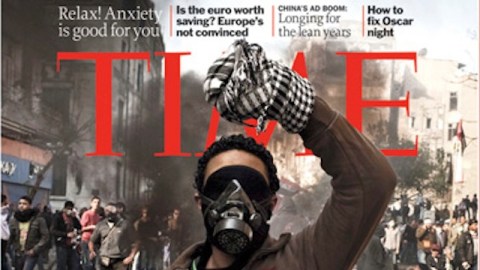Why Americans Don’t Care

Compare the covers of the different editions of the latest issue of Time. In most of the world, the cover of the magazine features a striking image of an Egyptian rioter in a gas mask. But the U.S. edition reduces the unrest to Egypt to small print and leads instead with a general series on “Why Anxiety Is Good for You.”
The cover is the main thing that’s different. The article on the ongoing revolution in Egypt is still in the U.S. edition. But the fact that the magazine ran a different cover for the U.S. edition is nevertheless telling. As David Airey shows, it’s not unusual for the U.S. edition to feature some story on marriage or family relationships while burying international news. Of course, you don’t have to go far back to see that there are also times when it’s the U.S. edition that features the hard international news. At the end of October, for example, the cover of the U.S. edition was about the real estate bubble in China, while the international editions all led with the release of Steven Spielberg and Peter Jackson’s new Tintin movie.
The international release of a blockbuster movie about Tintin—who has iconic status in much of the world—is at least news. But the Time series on anxiety is an evergreen, which means that because it’s not tied to current events it could run more or less at any time. Evergreen pieces are typically used to fill in during weeks when the news is slow. With the recent unrest in Egypt, news is hardly slow.
As Airey says, Time’s decision to devote its cover to a series on anxiety rather than to the riots in Egypt is not censorship, as some are suggesting. Americans can still read about Egypt in the pages of the magazine. The editors of the magazine—and it is certainly not just Time that makes these decisions—simply made a judgment about which cover was likely to sell more magazines. It’s not that Americans don’t care about what happens to Egyptians, but that it simply doesn’t personally affect them that much. The truth is that Time’s editors are probably right to think that another piece on rioting in the Middle East won’t sell many magazines in the U.S.
It would be easy to complain about how self-involved and shallow Americans are. But our relative lack of interest in foreign news primarily stems from the fact that historically Americans have rarely had to worry much about what was happening overseas. Isolationism has for much of our history been a luxury we could afford. Our strength and geographic position have generally made an attack on U.S. soil unlikely. And our large economy has insulated us to a large extent from fluctuations in the international economy. Globalization has changed this to an extent, although international trade is still a relatively small part of the U.S. national economy. Nevertheless, this insularity has a cost. Unrest in the Middle East and financial crises in Europe affect us more than now than ever before. It is time we started paying more attention.
Photo is an edited version of the Time Magazine cover (Timothy Fadek/Time Magazine)





